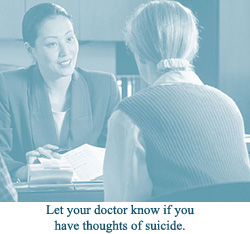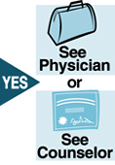Suicidal Thoughts
A lot of people think about suicide or say things like, “I wish
I was dead” at times of great stress. Casual thoughts of suicide
that don’t last may not in and of themselves be a sign of a problem.
For most people, they are a way to express anger, frustration and
other strong emotions. Suicidal thoughts could be a signal for help,
though, if they:
 |
Don’t go away or occur often |
 |
Lead to suicidal threats,
gestures or attempts |
 |
Are a symptom of a medical
illness or mental health condition, such as:
- Depression (See “Depression”.)
Up to 70% of persons who commit suicide are known to
have suffered from depression right before their deaths.
- Bipolar disorder (See “Bipolar
Disorder”.) Suicide can take place during either the
manic or depressive episodes.
- Grief/Bereavement (See "Grief/Bereavement".)
The loss of a loved one may provoke thoughts of suicide.
A person may find it hard to go on living without their
loved one or may want to be with him or her in death.
|
|
 |
Suicide
 |
Is more common in men than women. Men
commit four times as many suicides |
 |
Is attempted three times more often by
women than men (young women attempt suicide four to eight times more
often than young men) |
 |
Is committed more often by white men
than by black men |
 |
Has the highest rate in adults over
age 65 |
 |
Is the third leading cause of death
among 15-24 year olds, behind accidents and homicide |
Suicidal threats and attempts are a person’s way of letting others know
that he or she is in need of attention or wants someone to help them.
Suicide attempts and/or threats should never be taken lightly or taken only
as a “bluff.” Most people who threaten and/or attempt suicide more than once
usually succeed if they are not stopped.
Prevention and Treatment
 |
Knowing the warning signs for suicide (see “Questions to Ask” below) |
 |
Taking courses that teach problem solving, coping skills and suicide
awareness in schools and in the community |
 |
Addressing and treating the emotional and/or physical problems that
lead to thoughts and attempts of suicide, such as:
- Medical treatment for physical and/or mental health conditions,
such as depression. This includes monitoring medicine, if used.
|
 |
Therapy, such as individual and family counseling |
 |
Having frequent contact with family and friends |
 |
Keeping firearms, drugs and other means to commit suicide away
from potential victims |
 |
Emergency care and hospitalization, if necessary, after an
attempted suicide |
Questions to Ask
(Note: In some suicides, no warning signs are shown or
noticed.)
At this time, are any of the following present?
- Suicide attempts
- Suicidal gestures (e.g., standing on the edge of a
bridge, cutting the wrists with a dull instrument, or
driving recklessly on purpose)
- Plans are being made for suicide (e.g., the person has
gotten a weapon or pills that could be used for suicide)
- Repeated thoughts of suicide or death or stating
suicidal intent
|
 |
|

|
|
With previous thoughts of suicide or death, are any of these
conditions present?
- Depression
- Bipolar disorder (manic-depression )
- Schizophrenia
- Any other mental health or medical condition
|
 |
|

|
|
Has the person recently done any of the following?
- Given repeated statements that indicate suicidal
thoughts, such as “I want to be dead,” or “I don’t want to
live anymore,” or “How does a person leave their body to
science?”
- Given away favorite things, cleaned the house, and
gotten legal matters in order
- Suddenly felt better after being severely depressed,
specifically, stating something like: “everyday is okay” or
“now I know what I have to do” or “now I see how to make
everything better.”
|
 |
|

|
|
Have previous thoughts of suicide come as a result of one of
the following?
- Taking, stopping or changing the dose of a prescribed
medicine
- Using drugs and/or alcohol
|
 |
|

|
|
Does the person thinking about suicide have other blood
relatives who died from suicide or attempted suicide?
|
 |
|

|
|
Have suicidal thoughts come as a result of an upset in life,
such as any of the following?
- A divorce or separation
- The death of a loved one or other loss, such as the loss
of a job
- A rejection
- Being ridiculed
- Flunking a course
|
 |
|

|
|
Are symptoms of depression (see "Depression")
present?
- Feeling slowed down or restless and unable to sit still
- Feeling worthless or guilty
- Changes in appetite or weight loss or gain
- Thoughts of death or suicide
- Problems concentrating, thinking, remembering or making
decisions
- Trouble sleeping or sleeping too much
- Loss of energy or feeling tired all of the time
- Headaches
- Other aches and pains
- Digestive problems
- Sexual problems
- Feeling pessimistic or hopeless
- Being anxious or worried
|
 |
|

|
|
|

|
|
Self-Help
If You are Having Thoughts of Suicide
 |
Let someone know. Talk to a
trusted family member, friend or teacher. If it is hard for
you to talk directly to someone, write your thoughts down
and let someone else read them. |
 |
Call your local crisis
intervention or suicide prevention hotline. Look in your
local phone book or call directory assistance or the
operator for the number. Follow up with a visit to your
doctor or local mental health center, if instructed to do
so. |
What You Can Do for a Friend or Relative
If someone you know shows the warning signs and symptoms of
suicide, the following suggestions can help you save a life:
 |
Listen. Allow your friend or
relative to express their feelings to you. |
 |
Keep the person talking. Ask
questions to keep a discussion going including, “Are you
thinking about hurting or killing yourself?” |
 |
Try to determine if the person
would attempt to harm himself or herself. |
 |
Take action if you suspect the
person is seriously considering suicide. Get help, but do
not leave him or her alone until you do get help. Ways to
get help:
- Urge the person to make the call for help. If he or
she is already under the care of a health provider, have
the person contact that provider first. If not, other
places to contact are suicide prevention and crisis
intervention hotlines, student counseling center,
community mental health clinics and hospital emergency
rooms.
- Make the call yourself if the person cannot or will
not.
|
 |
Express interest and give
support. Your friend or relative needs to know that someone
is genuinely interested in their welfare. Most suicidal
persons feel isolated from other people. |
 |
Don’t judge. The person needs
an objective “ear,” not someone to preach moral values. |
 |
Take him or her seriously. If
your friend or relative threatens or informs you of their
suicidal intentions, believe him or her. |
 |
Watch and protect him or her.
Remove all sharp objects, pills, guns and bullets, etc. |
 |
Express your care and concern.
Tell your friend or relative how much they mean to you and
how important it is to you that they stay alive.
|
 |
Tell your friend or relative
that depression and suicidal tendencies can be treated.
Encourage them to get professional help. Assist them in
finding and getting help. |
|

 |
|










